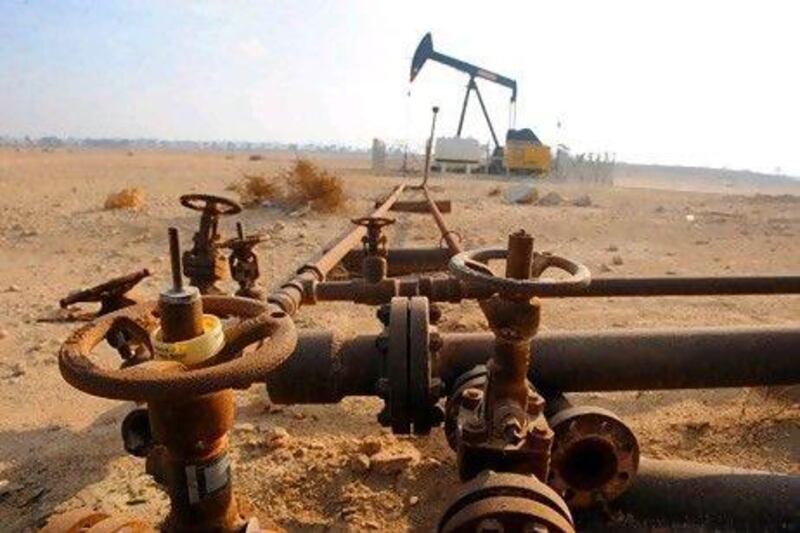Economic policymakers in GCC countries are watching the decline in the price of oil and wondering whether they have they got their sums right in planning state budgets.
The price of a barrel of Brent crude hit an 18-month low last week, falling below the US$90 level. At that price, it is hovering close to the levels at which some countries in Opec have drawn up their annual spending plans.
"It is not panic yet, but it's a risky situation. It's important to bear in mind how markets have behaved in the past, especially in 2008," says Jarmo Kotilaine, the chief economist with National Commercial Bank of Saudi Arabia.
Four years ago, oil markets plummeted as the financial crisis took hold, driving the price down to below $50 a barrel on fears the world's leading economies were heading towards recession.
"If it's the 2008 scenario, some countries may be in for a couple of lean quarters," says Mr Kotilaine. "But it's important to keep the overall picture in perspective. Maybe there was irrational exuberance at the beginning of this year, but now it could be irrational pessimism."
Other regional economists warn against putting too much importance on budget break-even prices. Emirates NBD caused a stir in the UAE in April when it calculated a headline break-even of $107 per barrel, but the bank believes the actual figure is of only limited relevance to policymakers as they draw up budgets.
"The point was missed that it doesn't really matter if GCC countries run deficits," says Khatija Haque, a senior economist at Emirates NBD. "They have big foreign exchange reserves and little foreign debt, so they can afford to run deficits for a time."
Since the $107 figure was first suggested, the UAE budget has changed anyway, with research from the IMF suggesting the country is going to run a pretty tight spending regime this year and next. This will have the effect of lowering the break-even figure further.
Most estimates put the average break-even figure for the six GCC countries at about $70 per barrel, but some nations are more vulnerable than others.
Kuwait and Saudi Arabia are towards the bottom end of the break-even scale, with the UAE still towards the top.
In Qatar, where most revenue comes from the less-than-transparent gas industry, it is difficult to calculate a break-even figure.
Bahrain consumes a lot of its own oil, experts say, and in any case runs a fairly balanced budget. It also has Saudi Arabia as a lender of last resort.
"Although the oil prices assumptions used in GCC budgets tend to be comfortably below the current market price, the margin has shrunk significantly," says Mr Kotilaine in Emirates NBD's most recent report.
"In practice, the hydrocarbon-rich regional economies have substantial cushions, along with low levels of government debt, that will enable them to weather periods of deficit spending. Bahrain, Oman, and Dubai are in the least comfortable fiscal situation due to the relatively advanced depletion of their hydrocarbons reserve."
Nonetheless, it is generally agreed that the economic and business environment of the region is positively affected by rising oil prices. Energy revenue accounts for as much as 80 per cent of total state income in the region as a whole.
Even for those states with comparatively meagre oil resources, there is a "feelgood" factor associated with high oil prices that boosts the general economy.
So where do the experts believe the oil price is heading? Capital Economics, a consultancy based in London that has been among the most bearish on oil prices, has set an average price of $85 per barrel over the next 18 months, but believes there could still be volatility.
"This average doesn't preclude either a brief recovery towards $100, or further sharp falls," says Julian Jessopat Capital Economics.
Capital says the main catalyst for the recent falls has come mainly from the United States, where there are worries about the strength of the economic recovery. It says the fears about the Chinese economy are overdone, for this year at least.
"The main downside risk to oil prices comes from the crisis in the euro zone, which we do expect to worsen. The economic downturn is already a significant drag on energy prices, while the threat of some form of euro break-up will continue to undermine global risk appetite and should support the dollar," says Mr Jessop.
But the oil price could also rise on renewed tensions over Iran, which were big factors in the steady rises in crude in the first quarter.
"The impact would probably be small providing the flow of oil through the Strait of Hormuz were not disrupted," adds Mr Jessop, referring to the full embargo of Iranian crude supplies by European countries, which comes into effect next week.
The consensus among regional experts is that there will be renewed downward pressure on oil.
"The biggest cloud in the sky is mounting worries about demand erosion, which offers awkward reminders of what happened in 2008 when global oil consumption contracted by 4 million barrels per day," says Mr Kotilaine.
"The main risks now emanate from Europe … This anxiety has been further fuelled by more disappointing US data and indications that growth is also fairly consistently slowing down in the key emerging markets."
But he believes there could be an upside to the deteriorating global economic outlook, if policymakers consider new stimulus measures that could have positive implications for all commodity prices, especially from China.
So regional policymakers will continue to have one eye on the price of crude as they plan budgets for this year and next. But with big financial reserves, access to other forms of funding, such as sovereign debt markets, and a willingness to adopt temporary deficit funding measures, there are plenty of budgeting alternatives.
twitter: Follow and share our breaking business news. Follow us
iPad users can follow our twitterfeed via Flipboard - just search for Ind_Insights on the app.





